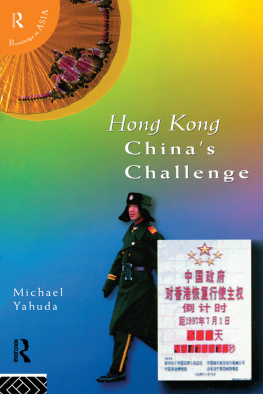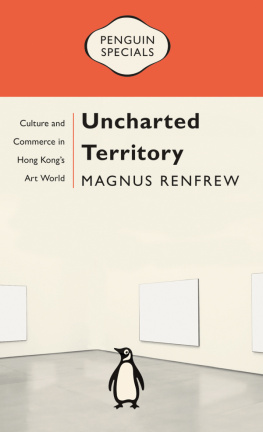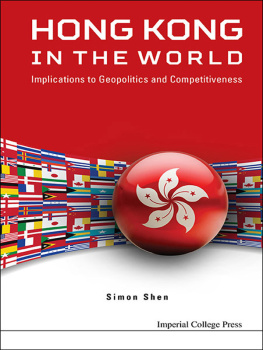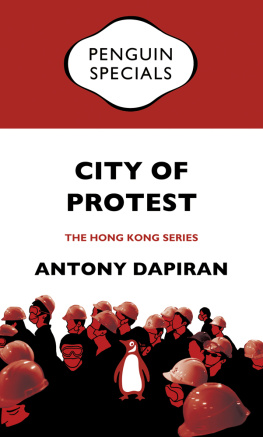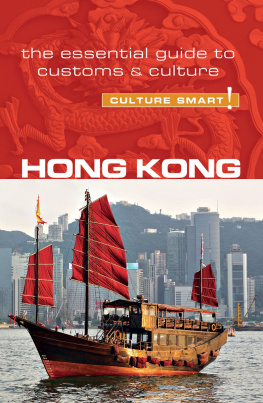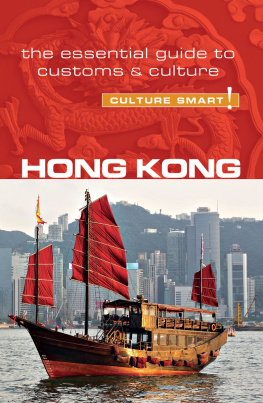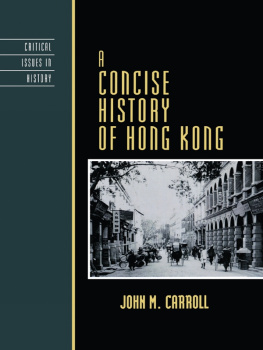SUNY series in Global Modernity
Arif Dirlik, editor
Lost in Transition
Hong Kong Culture in the Age of China
Yiu-Wai Chu
Published by State University of New York Press, Albany
2013 State University of New York
All rights reserved
Printed in the United States of America
No part of this book may be used or reproduced in any manner whatsoever without written permission. No part of this book may be stored in a retrieval system or transmitted in any form or by any means including electronic, electrostatic, magnetic tape, mechanical, photocopying, recording, or otherwise without the prior permission in writing of the publisher.
For information, contact State University of New York Press, Albany, NY
www.sunypress.edu
Production, Ryan Morris
Marketing, Michael Campochiaro
Library of Congress Cataloging-in-Publication Data
Zhu, Yaowei, 1965
Lost in transition : Hong Kong culture in the age of China / Yiu-Wai Chu.
p. cm. (SUNY series in global modernity)
Includes bibliographical references and index.
ISBN 978-1-4384-4645-5 (hardcover : alk. paper)
1. Hong Kong (China)Social life and customs. 2. Hong Kong (China)Social conditions. 3. Hong Kong (China)Intellectual life. 4. Social changeChinaHong Kong. 5. Group identityChinaHong Kong. 6. GlobalizationSocial aspectsChinaHong Kong. 7. National characteristics, Chinese. 8. Hong Kong (China)RelationsChina. 9. ChinaRelationsChinaHong Kong. I. Title.
DS796.H75Z469 2013
951.2506dc23
2012022117
10 9 8 7 6 5 4 3 2 1
A note on translation and romanization: all translations from Chinese materials are mine unless otherwise stated; for film titles, I have used the corresponding English export titles, and for Chinese names, I have retained the way they have been transliterated by convention in Hong Kong, Taiwan, and the Mainland.
Acknowledgments
An inveterate supporter of Hong Kong culture, I have been consuming Hong Kong movies, television, and Cantonese popular songs since my early childhood. I truly appreciate what a glorious age of Hong Kong culture it was to grow up in. But most of this book was written over the past decade, the time in which Hong Kong culture was generally agreed to be in sharp decline. Hong Kong has been facing some very important changes since its reversion to China, and I have always been thinking that it is necessary to account for them. I owe a special debt to Arif Dirlik for the successful publication of this book, which gives me the opportunity to put together my thoughts on Hong Kong culture. His work has been exemplary for me in linking postcolonial discourse to the inspirational concept of global modernity. For his helpful encouragement and support on different occasions I must express my deep gratitude. It would be impossible for me to mention all the names without whose help this book could not have been completed. Since my years in Graduate School I have benefited enormously from the insights of Kin-Yuen Wong. To him, teacher and friend, I have a long-standing debt, both professional and personal. I must also gratefully acknowledge, among others, Chris Berry, Leonard Chan, Ying-hsiung Chou, Rey Chow, and Ping-hui Liao for their helpful comments on different parts of earlier versions of this book and/or untiring support over the years. Their work also inspired me in many ways. I am humbled by the comments and endorsement of the anonymous reviewers, whose suggestions woke me from my dogmatic slumbers. I remain grateful for my colleagues in the Humanities Program and the Department of Chinese of Hong Kong Baptist University. They have proven how academic acquaintance can turn into charming friendship. My thanks also go to Nancy Ellgate of SUNY Press. Without her professional assistance the preparation of this manuscript would have never been an enjoyable process.
Sections of some of the chapters were previously published in the following journals or books, and I thank the publishers for granting permission to reprint them here: sections of ; Can Cantopop Industry be Creative? The Transmission and Transformation of Hong Kong Popular Songs, in Chinese Culture: Transmission and Transformation, ed. Wong Wang-chi et al. (Hong Kong: The Chinese University Press, 2009), 44375; The Transformation of Local Identity in Hong Kong Cantopop, Perfect Beat: The Pacific Journal of Research into Contemporary Music and Popular Culture (Sydney: Dept of Contemporary Music Studies, Macquarie University) 7:4 (Jan. 2006): 3251. All of them have been modified, revised and/or expanded for this book. I remain indebted to the editors for including my work in their publications.
To Nancy, Sebastian, Nathaniel, our dearest family members, and our future in Hong Kong, I dedicate this book.
Yiu-Wai Chu
May 2012
Introduction
After the End
I n 1995, Fortune wrote a cover story for its international editions entitled The Death of Hong Kong, claiming that the naked truth about Hong Kong's future can be summed up in two words: It's over. In fact, Hong Kong had been under the shadow of 1997 for almost two decades before its reversion to China. One of the major watersheds was arguably Lady Margaret Thatcher's infamous slip on the steps in front of the Great Hall of the People in Beijing in 1982. Before the slip, Lady Thatcher had a heated exchange of ideas with Deng Xiaoping, the late leader of the People's Republic of China (PRC), in the Great Hall of the People regarding the future of Hong Kong. Deng made it very clear that Hong Kong's return to the motherland on July 1, 1997 would not be compromised, and the Iron Lady was reportedly so taken aback that she tumbled down the stairs upon leaving. Immediately after the incident, the real estate and stock markets dipped as Hong Kong's fear of its end in 1997 eventually came to the fore. After the signing of the Sino-British Joint Declaration in 1984, in which the United Kingdom's government affirmed that it would hand over Hong Kong to the People's Republic of China with effect from July 1, 1997, Hong Kong's culture was obsessed with China on the one hand and fin de sicle on the other. The innovative One Country, Two Systems concept proposed by the late Deng Xiaoping served to soothe the anxieties of Hong Kong people, but the populace had grave doubts about whether this could be realized, and thus 1997 was seen by many as the end of Hong Kong.
Hong Kong did not die in 1997. To the surprise of those who had no trust in Deng's experiment, 1997 was, in a sense, anticlimactic. People expected dramatic changes, but the unchanged for 50 years slogan proved to be realizedat least in the first few years after the handover. As aptly put by Allen Chun, 1997 turned out to be a year of no significance:
The ritual faade of the handover has marked the fictive significance of 1997, and the fiction of Hong Kong's autonomy in a meaningless ideological framework has reset the clock again on its eventual integration with the mainland. In Hong Kong, embrace of the motherland has instead refined institutional capitalism to new heights.


